(全国100所名校单元测试示范卷)高考英语 第一套 Unit1-2(必修1)
- 格式:doc
- 大小:121.00 KB
- 文档页数:14
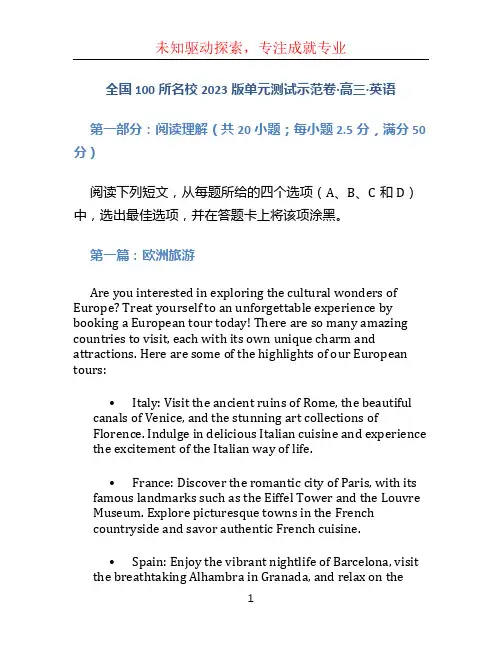
全国100所名校2023版单元测试示范卷·高三·英语第一部分:阅读理解(共20小题;每小题2.5分,满分50分)阅读下列短文,从每题所给的四个选项(A、B、C和D)中,选出最佳选项,并在答题卡上将该项涂黑。
第一篇:欧洲旅游Are you interested in exploring the cultural wonders of Europe? Treat yourself to an unforgettable experience by booking a European tour today! There are so many amazing countries to visit, each with its own unique charm and attractions. Here are some of the highlights of our European tours:•Italy: Visit the ancient ruins of Rome, the beautiful canals of Venice, and the stunning art collections ofFlorence. Indulge in delicious Italian cuisine and experience the excitement of the Italian way of life.•France: Discover the romantic city of Paris, with its famous landmarks such as the Eiffel Tower and the Louvre Museum. Explore picturesque towns in the Frenchcountryside and savor authentic French cuisine.•Spain: Enjoy the vibrant nightlife of Barcelona, visit the breathtaking Alhambra in Granada, and relax on thebeautiful beaches of Costa del Sol. Experience the richculture and traditions of Spain.•Germany: Explore the historic sights of Berlin, go beer tasting in Munich, and take a scenic drive along theRomantic Road. Discover the Christmas markets during the winter season for a magical experience.Choose from our various tour packages to customize your European adventure. Whether you prefer an action-packed tour with lots of sightseeing or a more relaxed itinerary with plenty of free time, we have the perfect tour for you. Don’t miss out on the opportunity to create lifelong memories while exploring the best of Europe.1.What is the main purpose of the text?A. To provide information about European tours.B. To explain the history of European countries.C. To introduce famous landmarks in Europe.D. To promote Italian cuisine.2.Which country is famous for its Christmas markets?A. Italy.B. France.C. Spain.D. Germany.3.What can tourists do in Barcelona?A. Visit ancient ruins.B. Go beer tasting.C. Enjoy the vibrant nightlife.D. Take a scenic drive.第二篇:手机依赖症With the increasing popularity of smartphones, more and more people are becoming dependent on them for various aspects of their lives. This excessive reliance on smartphones has led to a condition known as。
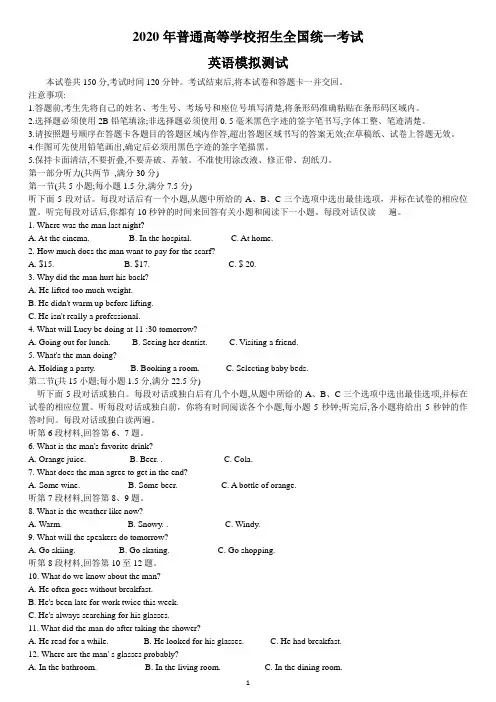
2020年普通高等学校招生全国统一考试英语模拟测试本试卷共150分,考试时间120分钟。
考试结束后,将本试卷和答题卡一并交回。
注意事项:1.答题前,考生先将自己的姓名、考生号、考场号和座位号填写清楚,将条形码准确粘贴在条形码区域内。
2.选择题必须使用2B铅笔填涂;非选择题必须使用0. 5毫米黑色字迹的签字笔书写,字体工整、笔迹清楚。
3.请按照题号顺序在答题卡各题目的答题区域内作答,超出答题区域书写的答案无效;在草稿纸、试卷上答题无效。
4.作图可先使用铅笔画出,确定后必须用黑色字迹的签字笔描黑。
5.保持卡面清洁,不要折叠,不要弄破、弄皱。
不准使用涂改液、修正带、刮纸刀。
第一部分听力(共两节,满分30分)第一节(共5小题;每小题1.5分,满分7.5分)听下面5段对话。
每段对话后有一个小题,从题中所给的A、B、C三个选项中选出最佳选项,并标在试卷的相应位置。
听完每段对话后,你都有10秒钟的时间来回答有关小题和阅读下一小题。
每段对话仅读- - 遍。
1. Where was the man last night?A. At the cinema.B. In the hospital.C. At home.2. How much does the man want to pay for the scarf?A. $15.B. $17.C. $ 20.3. Why did the man hurt his back?A. He lifted too much weight.B. He didn't warm up before lifting.C. He isn't really a professional.4. What will Lucy be doing at 11 :30 tomorrow?A. Going out for lunch.B. Seeing her dentist.C. Visiting a friend.5. What's the man doing?A. Holding a party.B. Booking a room.C. Selecting baby beds.第二节(共15小题;每小题1.5分,满分22.5分)听下面5段对话或独白。
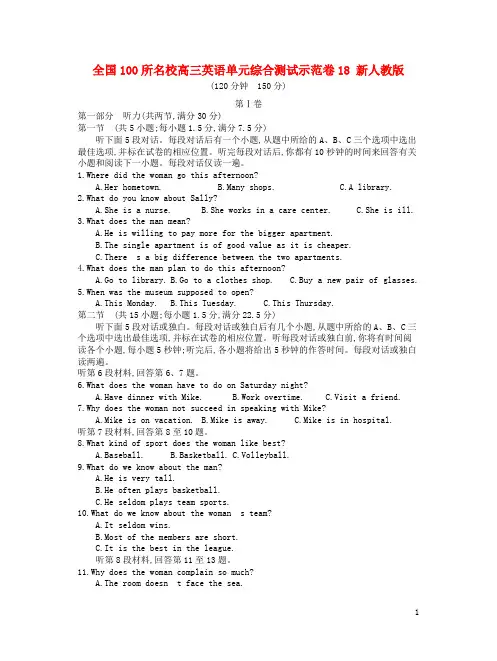
全国100所名校高三英语单元综合测试示范卷18 新人教版(120分钟150分)第Ⅰ卷第一部分听力(共两节,满分30分)第一节(共5小题;每小题1.5分,满分7.5分)听下面5段对话。
每段对话后有一个小题,从题中所给的A、B、C三个选项中选出最佳选项,并标在试卷的相应位置。
听完每段对话后,你都有10秒钟的时间来回答有关小题和阅读下一小题。
每段对话仅读一遍。
1.Where did the woman go this afternoon?A.Her hometown.B.Many shops.C.A library.2.What do you know about Sally?A.She is a nurse.B.She works in a care center.C.She is ill.3.What does the man mean?A.He is willing to pay more for the bigger apartment.B.The single apartment is of good value as it is cheaper.C.There s a big difference between the two apartments.4.What does the man plan to do this afternoon?A.Go to library.B.Go to a clothes shop.C.Buy a new pair of glasses.5.When was the museum supposed to open?A.This Monday.B.This Tuesday.C.This Thursday.第二节(共15小题;每小题1.5分,满分22.5分)听下面5段对话或独白。
每段对话或独白后有几个小题,从题中所给的A、B、C三个选项中选出最佳选项,并标在试卷的相应位置。
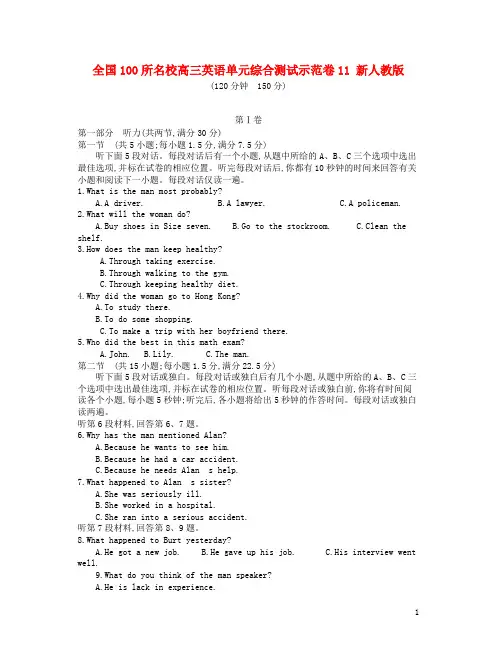
全国100所名校高三英语单元综合测试示范卷11 新人教版(120分钟150分)第Ⅰ卷第一部分听力(共两节,满分30分)第一节(共5小题;每小题1.5分,满分7.5分)听下面5段对话。
每段对话后有一个小题,从题中所给的A、B、C三个选项中选出最佳选项,并标在试卷的相应位置。
听完每段对话后,你都有10秒钟的时间来回答有关小题和阅读下一小题。
每段对话仅读一遍。
1.What is the man most probably?A.A driver.B.A lawyer.C.A policeman.2.What will the woman do?A.Buy shoes in Size seven.B.Go to the stockroom.C.Clean the shelf.3.How does the man keep healthy?A.Through taking exercise.B.Through walking to the gym.C.Through keeping healthy diet.4.Why did the woman go to Hong Kong?A.To study there.B.To do some shopping.C.To make a trip with her boyfriend there.5.Who did the best in this math exam?A.John.B.Lily.C.The man.第二节(共15小题;每小题1.5分,满分22.5分)听下面5段对话或独白。
每段对话或独白后有几个小题,从题中所给的A、B、C三个选项中选出最佳选项,并标在试卷的相应位置。
听每段对话或独白前,你将有时间阅读各个小题,每小题5秒钟;听完后,各小题将给出5秒钟的作答时间。
每段对话或独白读两遍。
听第6段材料,回答第6、7题。
6.Why has the man mentioned Alan?A.Because he wants to see him.B.Because he had a car accident.C.Because he needs Alan s help.7.What happened to Alan s sister?A.She was seriously ill.B.She worked in a hospital.C.She ran into a serious accident.听第7段材料,回答第8、9题。
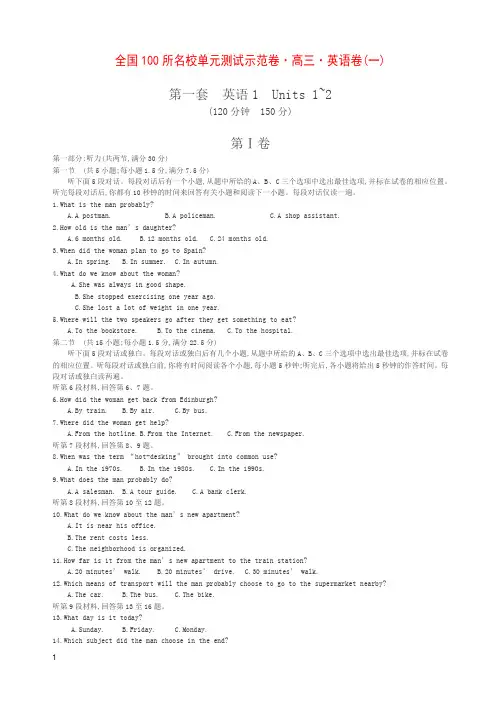
全国100所名校单元测试示范卷·高三·英语卷(一)第一套英语1 Units 1~2(120分钟150分)第Ⅰ卷第一部分:听力(共两节,满分30分)第一节(共5小题;每小题1.5分,满分7.5分)听下面5段对话。
每段对话后有一个小题,从题中所给的A、B、C三个选项中选出最佳选项,并标在试卷的相应位置。
听完每段对话后,你都有10秒钟的时间来回答有关小题和阅读下一小题。
每段对话仅读一遍。
1.What is the man probably?A.A postman.B.A policeman.C.A shop assistant.2.How old is the man’s daughter?A.6 months old.B.12 months old.C.24 months old.3.When did the woman plan to go to Spain?A.In spring.B.In summer.C.In autumn.4.What do we know about the woman?A.She was always in good shape.B.She stopped exercising one year ago.C.She lost a lot of weight in one year.5.Where will the two speakers go after they get something to eat?A.To the bookstore.B.To the cinema.C.To the hospital.第二节(共15小题;每小题1.5分,满分22.5分)听下面5段对话或独白。
每段对话或独白后有几个小题,从题中所给的A、B、C三个选项中选出最佳选项,并标在试卷的相应位置。
听每段对话或独白前,你将有时间阅读各个小题,每小题5秒钟;听完后,各小题将给出5秒钟的作答时间。
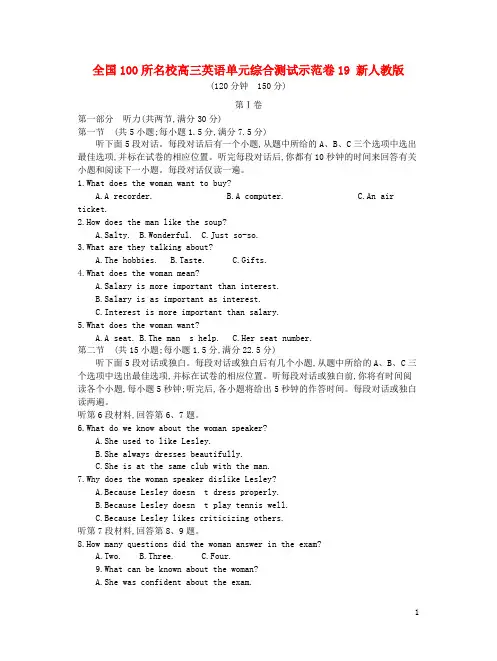
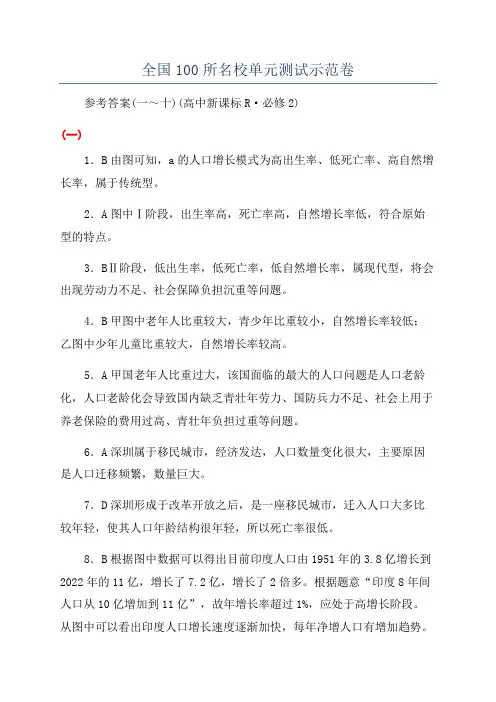
全国100所名校单元测试示范卷参考答案(一~十)(高中新课标R·必修2)(一)1.B由图可知,a的人口增长模式为高出生率、低死亡率、高自然增长率,属于传统型。
2.A图中Ⅰ阶段,出生率高,死亡率高,自然增长率低,符合原始型的特点。
3.BⅡ阶段,低出生率,低死亡率,低自然增长率,属现代型,将会出现劳动力不足、社会保障负担沉重等问题。
4.B甲图中老年人比重较大,青少年比重较小,自然增长率较低;乙图中少年儿童比重较大,自然增长率较高。
5.A甲国老年人比重过大,该国面临的最大的人口问题是人口老龄化,人口老龄化会导致国内缺乏青壮年劳力、国防兵力不足、社会上用于养老保险的费用过高、青壮年负担过重等问题。
6.A深圳属于移民城市,经济发达,人口数量变化很大,主要原因是人口迁移频繁,数量巨大。
7.D深圳形成于改革开放之后,是一座移民城市,迁入人口大多比较年轻,使其人口年龄结构很年轻,所以死亡率很低。
8.B根据图中数据可以得出目前印度人口由1951年的3.8亿增长到2022年的11亿,增长了7.2亿,增长了2倍多。
根据题意“印度8年间人口从10亿增加到11亿”,故年增长率超过1%,应处于高增长阶段。
从图中可以看出印度人口增长速度逐渐加快,每年净增人口有增加趋势。
9.C可用排除法,人口增长快,劳动力充足,但由于人口多,消耗也多,积累较少;印度没有大面积的热带雨林,故②错。
10.D根据材料描述,导致华北人口迁移的原因是华北大旱导致华北的环境人口容量变小。
11.B华北男性人口大批移民东北,华北青壮年男性人口明显少于相同年龄段的女性人口,又因为清末我国人口出生率高,所以相对来说儿童的比例大,因此B图正确。
12.D图中迁移人口主要集中在20~29岁,这部分人口属于劳动力人口,人口迁移最可能受经济因素影响。
13.A图中甲为0~4岁的儿童,儿童的迁移主要与父母的迁移有关;图中乙为20~29岁的青年人口,与甲的关联性最强。
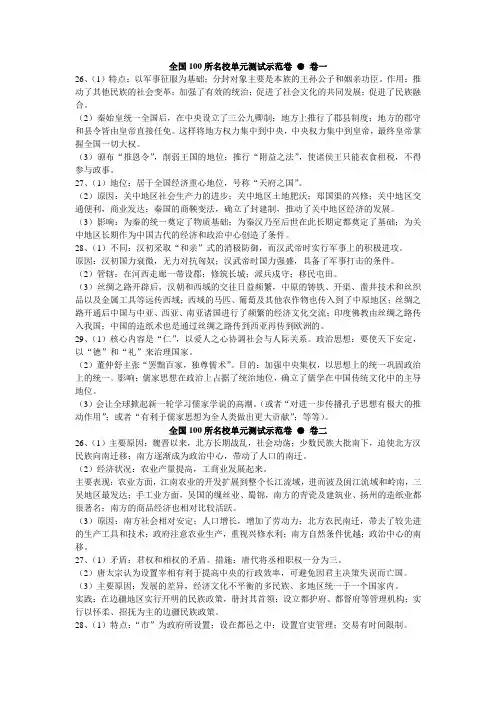
全国100所名校单元测试示范卷●卷一26、(1)特点:以军事征服为基础;分封对象主要是本族的王孙公子和姻亲功臣。
作用:推动了其他民族的社会变革;加强了有效的统治;促进了社会文化的共同发展;促进了民族融合。
(2)秦始皇统一全国后,在中央设立了三公九卿制;地方上推行了郡县制度;地方的郡守和县令皆由皇帝直接任免。
这样将地方权力集中到中央,中央权力集中到皇帝,最终皇帝掌握全国一切大权。
(3)颁布“推恩令”,削弱王国的地位;推行“附益之法”,使诸侯王只能衣食租税,不得参与政事。
27、(1)地位:居于全国经济重心地位,号称“天府之国”。
(2)原因:关中地区社会生产力的进步;关中地区土地肥沃;郑国渠的兴修;关中地区交通便利,商业发达;秦国的商鞅变法,确立了封建制,推动了关中地区经济的发展。
(3)影响:为秦的统一奠定了物质基础;为秦汉乃至后世在此长期定都奠定了基础;为关中地区长期作为中国古代的经济和政治中心创造了条件。
28、(1)不同:汉初采取“和亲”式的消极防御,而汉武帝时实行军事上的积极进攻。
原因:汉初国力衰微,无力对抗匈奴;汉武帝时国力强盛,具备了军事打击的条件。
(2)管辖:在河西走廊一带设郡;修筑长城;派兵戍守;移民屯田。
(3)丝绸之路开辟后,汉朝和西域的交往日益频繁,中原的铸铁、开渠、凿井技术和丝织品以及金属工具等远传西域;西域的马匹、葡萄及其他农作物也传入到了中原地区;丝绸之路开通后中国与中亚、西亚、南亚诸国进行了频繁的经济文化交流;印度佛教由丝绸之路传入我国;中国的造纸术也是通过丝绸之路传到西亚再传到欧洲的。
29、(1)核心内容是“仁”,以爱人之心协调社会与人际关系。
政治思想:要使天下安定,以“德”和“礼”来治理国家。
(2)董仲舒主张“罢黜百家,独尊儒术”。
目的:加强中央集权,以思想上的统一巩固政治上的统一。
影响:儒家思想在政治上占据了统治地位,确立了儒学在中国传统文化中的主导地位。
(3)会让全球掀起新一轮学习儒家学说的高潮。
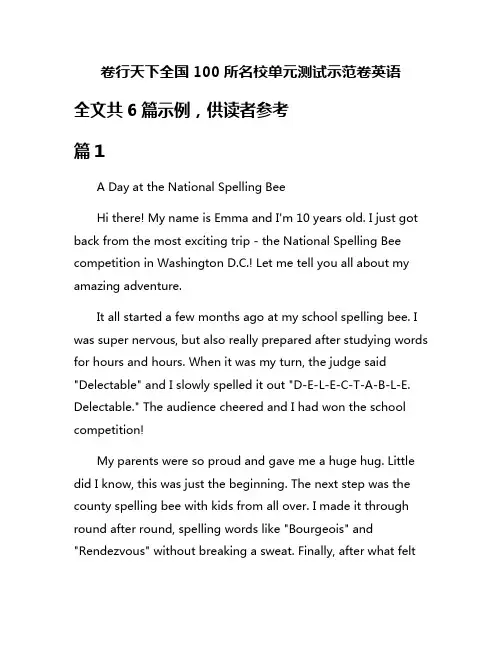
卷行天下全国100所名校单元测试示范卷英语全文共6篇示例,供读者参考篇1A Day at the National Spelling BeeHi there! My name is Emma and I'm 10 years old. I just got back from the most exciting trip - the National Spelling Bee competition in Washington D.C.! Let me tell you all about my amazing adventure.It all started a few months ago at my school spelling bee. I was super nervous, but also really prepared after studying words for hours and hours. When it was my turn, the judge said "Delectable" and I slowly spelled it out "D-E-L-E-C-T-A-B-L-E. Delectable." The audience cheered and I had won the school competition!My parents were so proud and gave me a huge hug. Little did I know, this was just the beginning. The next step was the county spelling bee with kids from all over. I made it through round after round, spelling words like "Bourgeois" and "Rendezvous" without breaking a sweat. Finally, after what feltlike forever, I heard the judge say "Congratulations Emma, you're headed to the national finals in Washington D.C.!"The day before the big event, my family and I explored the National Mall and saw amazing sights like the Lincoln Memorial and the Washington Monument. Everywhere I looked there were schools and groups preparing for the competition. I felt nervous but also determined.When the day arrived, we walked into the huge convention center where the spelling bee was being held. The stage looked tiny compared to the thousands of seats packed with spectators. Cameras were everywhere! After a brief practice round, the real contest began.One by one, kids around my age took the stage and spelled incredibly difficult words from all kinds of languages. The judges never went easy on us. Some words I remember were "Eczema", "Zealous", and "Memento". Whenever someone misspelled a word, a loud bell would ring and they had to walk off stage. With each round, more and more spellers got eliminated until only a few of us were left.It was finally my turn to take the stage. The bright lights shone in my eyes and I could hear my heartbeat pounding in my ears. "Your word is...Supercalifragilisticexpialidocious" the judgeannounced. I thought carefully, saying each part of the massive word over and over in my mind. Then with a deep breath, I began "S-U-P-E-R-C-A-L-I-F-R-A...". No bell rang, and I kept going all the way until the very end. The audience erupted in cheers!A few more rounds went by and I just kept nailing every word thrown my way. "Anemone. Moccasin. Hierarchy." You name it, I spelled it right. It came down to just me and one other contestant. We went back and forth, seemingly unable to misspell anything.Then, the moment of truth. "Emma, your wordis...Rhathymia." It was a doozy, and not one I had studied before.I repeated it over and over, sounding it out in my head. I realized it must be related to the word "rhythm", and that gave me a clue about the opening sound. Finally, I gave it my best shot"R-H-Y-T-H-M-I-A. Rhathymia."An eternal pause followed, and then..."That is correct! Emma from Michigan is this year's National Spelling Bee champion!"I let out a huge cheer and jumped up and down with excitement. My parents ran on stage to hug me and I had finally achieved my dream. All those late nights of studying weird words had really paid off. To celebrate, we went to the fanciestrestaurant I've ever been to and I got to order one of every dessert on the menu. Delectable indeed!That's my story of how an ordinary 10-year-old like me became a spelling champion. If you work hard and never give up, amazing things can happen. I'll never forget this experience and I can't wait to go back and defend my title next year. Thanks for reading, and be sure to spell C-H-E-C-K-I-T-O-U-T if you want to see more of my adventures!篇2National 100 Top Schools Unit Test Sample - EnglishHi there! My name is Lily and I'm a 5th grader. Today I'm going to share with you the English unit test we just took at my school. It was pretty tough but I'll do my best to explain everything. Let's get started!Reading ComprehensionThe first section was reading comprehension. We had to read three different passages and answer multiple choice questions about them.The first passage was about a brother and sister who went camping with their dad in the mountains. They saw lots of coolanimals like deer, rabbits, and even a bear! The bear scared them at first but it just walked away without bothering them. Some of the questions asked what animals they saw, where they went camping, and why they got scared.The second passage described a science experiment where you make a baking soda and vinegar volcano. I've actually done that one before - it's really neat how the baking soda and vinegar react to create an eruption! The questions were about the materials needed, the steps to follow, and what happens during the chemical reaction.The last reading passage talked about a girl named Amy who joined her school's soccer team. At first she wasn't very good and got upset, but with practice she improved a lot. By the end of the season, she scored the winning goal in the championship game! Those questions covered the main events, Amy's different feelings throughout the story, and what the moral or lesson was.WritingNext up was the writing section. We had two tasks for this part.For the first one, we had to read a short story about a boy who forgot his lunch at home. We had to summarize the keypoints of the story in 4-5 sentences. I tried to cover the main character, what happened, the problem he faced, and how it was resolved at the end.The second writing task was an opinion essay. The prompt asked us whether we think kids should have to wear school uniforms or not. We had to give our opinion, explain our reasons, and provide examples to support our view. I think school uniforms are a good idea because they are cheaper than having to buy a whole wardrobe of different outfits. Uniforms also prevent kids from being bullied over the clothes they wear and help everyone feel equal. However, I can see why some kids might not like having to wear the same thing every day.GrammarFor the grammar section, we had to read sentences with blank spaces and choose the correct word to fill in the blank from multiple choices. These covered things like verb tenses, subject-verb agreement, pronouns, and more.One question was: "They ______ going to the movies later." The answer choices were is, am, was, were, and are. Since "they" is plural, the correct answer is "are."Another one said: "Mom bought ____ a new backpack." With answer choices me, I, mine, my. The correct one is "me" since it's the object of the sentence.There were probably around 15 questions total testing different grammar rules and concepts we've learned.VocabularyThe vocabulary part had us match words to their definitions, fill in missing letters to spell a word, and answer some basic meaning questions.For the matching part, we had to draw a line connecting each word to its meaning. Some of the words were "mischievous" (causing trouble in a playful way), "enormous" (extremely large), and "curious" (eager to learn).Then we had to fill in missing letters for partially spelled words like "fr_end" (friend), "oc_an" (ocean), and "c_mbine" (combine).Lastly, there were simple questions like "Which word means the opposite of 'ancient'?" The choices were "new, modern, recent, and latest." I picked modern since it's the opposite of very old.ListeningThe listening part was pretty hard! We had to listen carefully to some recordings and answer comprehension questions on what we heard.One recording was about two friends making plans to go to the park that weekend. It covered where they were going, what day and time, why they picked that place, and what activities they wanted to do there.Another one was giving instructions for how to make paper airplanes. It listed off the materials needed like paper, scissors, etc. and then described the step-by-step process for folding the airplane. Man, those audioinstructions were tough to follow just by listening!The last recording I remember was a short story about a girl who got lost at the mall and how she was finally reunited with her mom. We had to answer what happened, how she felt at different points, and how the situation was resolved.SpeakingThe very last section tested our speaking skills with some role-play scenarios and open-ended questions.For one role-play, I had to pretend I was talking to my friend and convincing them to join the school basketball team. I tried toexplain why it's a fun sport, how being on a team helps you make friends, and that you can learn skills like teamwork.Another scenario had me as a restaurant server taking someone's food order. I had to greet them politely, ask how I could help them, repeat their order back to confirm, and thank them.Then there were just some general open-ended opinion questions like, "What is your favorite holiday and why?" For that one, I said my favorite is Christmas because I love decorating the tree, eating special foods, and getting presents!Phew, that's finally the whole test! It covered so many different English skills like reading, writing, grammar, vocabulary, listening, and speaking. Parts of it were pretty challenging but I tried my best. Hopefully this helped give you an idea of what it's like. Let me know if you have any other questions!篇3My Big English Test Adventure!Wow, today was a really big day! We had our huge English test that's given to kids all across the country. I was prettynervous, but I studied really hard with my mom and dad. They helped me learn all the vocabulary words and grammar rules.The test was super long with reading, writing, listening, and speaking sections. I'm going to tell you all about my wild adventure taking this important test!Reading TimeFirst up was the reading part. I had to read a few different passages and answer questions about them. One story was about a brave knight who defeated a dragon to rescue a princess. It was so exciting! The knight used his sword and Shield to battle the ferocious dragon. There were some tricky words like "valiant" and "slay" that I had to figure out from the context clues.Another passage was about the rainforest and all the cool animals that live there. I learned about sloths, toucans, jaguars, and poisonous frogs. The reading was interesting but a bit hard because it used more advanced vocabulary. I had to concentrate really hard.After reading each passage, I answered multiple choice questions to show I understood the main ideas, vocabulary words, and details. Phew, that reading section really made my brain tired!The Writing ChallengeNext, we had to write an essay about our favorite books. I chose to write about the Harry Potter series because those books are so much fun to read. I made sure to write a topic sentence, supporting details in the body paragraphs, and a conclusion restating my main idea.It was hard to organize all my thoughts, but I tried my best to use correct grammar, spelling, and punctuation. Writing neatly was important too so the graders could read my awesome essay!Listening CloselyAfter the writing part, we moved on to the listening section. This was challenging because I had to listen really carefully to conversations and stories through headphones. The first conversation was between two friends making plans to go to the park. I had to identify details like the day, time, and location based on what they said.Then I listened to a story about a summer camp adventure. There were questions about the sequence of events, the characters, and the moral or lesson of the story. With listening, you can't daydream at all or you'll miss important information!My Talking TimeThe very last part was the speaking section. This made me the most nervous, but it actually went pretty well. I had to describe a fun experience I had, using clear pronunciation and lots of details. I talked about the time I went camping with my family and saw a shooting star!Then I had a pretend conversation with the test grader. He acted as a waiter and I was the customer ordering delicious diner food like pancakes, bacon, and orange juice. I tried to speak slowly and clearly, using polite phrases like "May I please have..." and "Thank you!"What an Adventure!Well, that's my story about taking the big national English test. It was an exciting adventure filled with readings, writings, listenings, and speakings galore!Even though parts were difficult, I felt prepared from all my studying. As long as I gave it my best effort, that's what counts.Now I get to enjoy a nice, relaxing summer vacation before starting a new grade next year. Maybe I'll even read some fun books...in English of course! Bring on the next English challenge!篇4My Big Test AdventureHi there! My name is Lily and I'm a 5th grader at Springdale Elementary. I just had the craziest experience that I can't wait to tell you all about!A few weeks ago, my teacher Mrs. Taylor told the class that some of us would be chosen to take a really important test. She said it was called the National Sample Test for the Top 100 Schools. Only the smartest kids from each grade would be picked to take it. I was super nervous but also really excited at the chance to represent my school.Sure enough, a few days later Mrs. Taylor announced that I was one of the students selected! I couldn't believe it at first. Little old me taking a national test? I was equal parts thrilled and scared out of my mind.Mrs. Taylor said the test would have reading, writing, math, and even science sections. It was going to be really hard but she said she knew I could do it if I studied my tail off. So that's exactly what I did!Every night for weeks, I hit the books for hours after school. My parents quizzed me on math facts and vocabulary words until I thought my brain would explode. I practically lived at the library, reading any books I could get my hands on about science topics like electricity and photosynthesis. I even started drinking coffee like a grown-up to help me stay awake and focus!Finally, the big day arrived. A bus pulled up to the school super early in the morning to take all of us test-takers to the exam site. My stomach was doing somersaults the whole ride. When we finally arrived, I couldn't believe my eyes! The building was HUGE, with fancy glass walls and a massive banner that said "Welcome National Test Takers!"After getting our test booklets and sharpened pencils, it was time to head inside. The room where we took the test was bigger than a gym, with row after row of desks as far as the eye could see. I felt so small!The nice test proctor told us to find our assigned desks and get started as soon as the clock struck 8 am. Those few minutes of waiting were the longest of my life. When 8 o'clock finally rolled around, you could have heard a pin drop in that massive room. Everyone started scribbling away furiously.I zoned in and tried my absolute best on every single question. Some of them were pretty tricky, but I applied all of the strategies Mrs. Taylor taught us for breaking down the problems. Before I knew it, a few hours had flown by and it was time for a snack break.When we headed back in, there were even more sections waiting for us - writing samples, reading comprehension, you name it. My hand was starting to cramp up but I didn't let that stop me from plugging away.At long last, the final test booklet was turned in. I couldn't believe I'd made it through the whole thing! As we walked back to the bus, my brain felt like a big mushy mess. I honestly didn't know whether I'd done well or bombed it completely.A couple of months went by before the results finally came back to our school. Mrs. Taylor gathered our class on the rug to go over them with us. One by one, she announced each person's scores and percentiles. I was practically biting my nails off, I was such a bundle of nerves!And then, she got to my name...and said I scored in the 99th percentile! Out of every test taker in the entire state, I was in the top 1 percent. I couldn't believe it! All those late nights ofstudying had really paid off. Mrs. Taylor gave me a big hug and told me how proud she was. My parents were just beaming.Even though it was crazy stressful, taking that huge test ended up being one of the coolest experiences ever. I'll never forget the feeling of accomplishment, and how hard work really does pay off in the end. Who knows, maybe I'll be a test-taking champion again someday! But for now, I'm just proud I represented my school and gave it my all.篇5National 100 Top Schools Unit Test Sample Paper for EnglishHey there, friends! It's me, your buddy Tommy, and today I'm going to share with you my experience with the National 100 Top Schools Unit Test for English. It was a pretty big deal, let me tell you!First off, let me explain what this test is all about. You see, every year, the best schools in the country come together and create a special exam called the National 100 Top Schools Unit Test. It's like a big competition, but instead of running or playing sports, we have to show off our skills in different subjects like math, science, and of course, English!Now, English is one of my favorite subjects, so I was really excited when our teacher announced that we would be taking part in the test this year. We had been studying hard all semester, learning new vocabulary words, practicing our grammar, and even reading some really cool stories from around the world.When the day of the test finally arrived, I could feel the butterflies in my stomach. I tried to stay calm by taking deep breaths and reminding myself that I had prepared well. Our teacher gave us some last-minute tips and encouragement before we headed into the exam room.The first part of the test was all about listening comprehension. We had to listen to a recorded passage and answer questions about what we heard. I remember it was a story about a little girl who loved to explore the forest near her home. Even though the passage was a bit tricky, I tried my best to focus and catch all the important details.Next up was the reading section. We had to read a few short passages and answer questions about the main ideas, characters, and vocabulary used. One of the passages was about a boy who loved to bake with his grandmother, and another was about a group of friends who went on an exciting camping trip. I reallyenjoyed reading these stories and using my comprehension skills to answer the questions.After the reading section, we moved on to grammar and vocabulary. This part was a bit more challenging, but thanks to all the practice we had done in class, I felt confident in my abilities. We had to identify parts of speech, correct grammar mistakes, and match vocabulary words with their definitions.Finally, we reached the writing section. This was my favorite part because I love to let my imagination run wild and create stories of my own. The prompt asked us to write about our dream vacation, and I couldn't wait to put pen to paper (or fingers to keyboard, in this case).I wrote about a fantastic adventure where I explored ancient ruins, swam in crystal-clear waters, and even saw a real-life volcano up close! I tried to use all the descriptive language and writing techniques we had learned in class to make my story come alive.When the test was over, I felt a sense of relief and accomplishment. Even though it was challenging, I had given it my all and done my best. Our teacher congratulated us on our hard work and reminded us that the most important thing was to learn and grow from the experience.A few weeks later, the results came in, and I was thrilled to find out that I had scored really well on the test! Not only that, but our entire class had performed exceptionally, and our school was ranked among the top schools in the country for English proficiency.I felt so proud of myself and my classmates for all the effort we had put in. It just goes to show that with dedication, hard work, and a love for learning, anything is possible!So, there you have it, friends – my experience with the National 100 Top Schools Unit Test for English. It was an exciting and rewarding journey, and I learned so much along the way. Who knows, maybe one day you'll get the chance to take this test too! Just remember to study hard, believe in yourself, and never stop exploring the wonderful world of language and literature.Until next time, keep reading, keep writing, and keep dreaming big!Your pal,Tommy篇6National Top 100 Schools Unit Test Sample EnglishHi everyone! My name is Emma and I'm a 5th grader. Today I want to tell you all about the big English test I just took. It was a sample unit test from one of the top 100 schools in the country! My teacher gave it to our whole class to try. She said it would get us ready for the real unit tests coming up. I was a little nervous at first, but it ended up being really fun!The test had four sections - listening, reading, writing, and speaking. The listening part was first. We had to listen to some recordings and answer multiple choice questions about what we heard. There were conversations between students, announcements over the school PA system, and even a short story! I got a little mixed up on one of the conversations because the people were talking kind of fast. But overall I think I did pretty well on that section.Next was the reading part. We had to read three different passages and answer questions about each one. The first passage was just a few paragraphs about polar bears. I already knew a lot about polar bears from our science unit, so that one was easy peasy. The second one was a short story that we had to put the events in order. That took some thinking, but I figured it out. The last reading passage was the hardest - it was a bunch offacts about ancient Egypt! I didn't know much about that topic, so I had to read really carefully to get the right answers.After the reading came the writing section. We had to write a letter to a pen pal introducing ourselves and our family. The instructions said to include lots of details and use complete sentences. I tried my best to check my spelling and grammar. Writing is one of my strengths, so I'm hoping I did a good job on that part. We'll have to wait and see when we get our test scores back!The very last part was the speaking section. For this, we had to go one-by-one to the front of the class. The teacher gave each of us a picture, and we had one minute to describe everything we saw in the picture. My picture showed a busy city street with cars, people, stores, and a park in the background. I made sure to use lots of descriptive words like "crowded," "tall buildings," and "green trees." Speaking English out loud is hard, but I practiced a lot so I think I spoke clearly.Phew, that test。
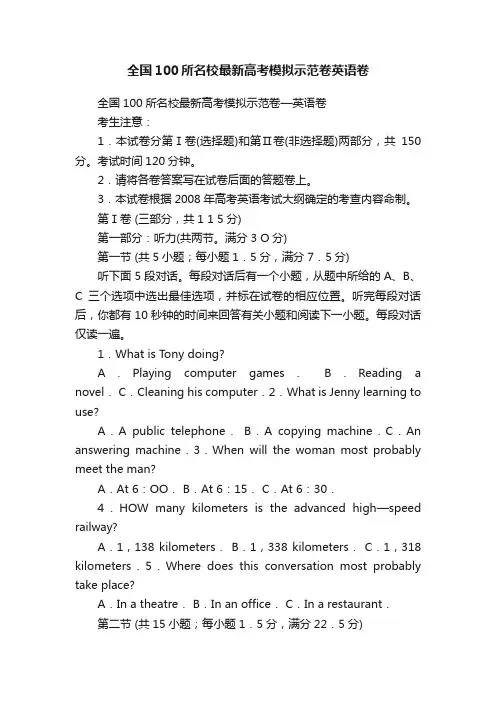
全国100所名校最新高考模拟示范卷英语卷全国100所名校最新高考模拟示范卷—英语卷考生注意:1.本试卷分第Ⅰ卷(选择题)和第Ⅱ卷(非选择题)两部分,共150分。
考试时间120分钟。
2.请将各卷答案写在试卷后面的答题卷上。
3.本试卷根据2008年高考英语考试大纲确定的考查内容命制。
第Ⅰ卷 (三部分,共1 1 5分)第一部分:听力(共两节。
满分3 O分)第一节 (共5小题;每小题1.5分,满分7.5分)听下面5段对话。
每段对话后有一个小题,从题中所给的A、B、C三个选项中选出最佳选项,并标在试卷的相应位置。
听完每段对话后,你都有10秒钟的时间来回答有关小题和阅读下一小题。
每段对话仅读一遍。
1.What is Tony doing?A.Playing computer games.B.Reading a novel. C.Cleaning his computer.2.What is Jenny learning to use?A.A public telephone.B.A copying machine.C.An answering machine.3.When will the woman most probably meet the man?A.At 6:OO. B.At 6:15. C.At 6:30.4.HOW many kilometers is the advanced high—speed railway?A.1,138 kilometers.B.1,338 kilometers.C.1,318 kilometers.5.Where does this conversation most probably take place?A.In a theatre. B.In an office. C.In a restaurant.第二节 (共15小题;每小题1.5分,满分22.5分)听下面5段对话或独白。
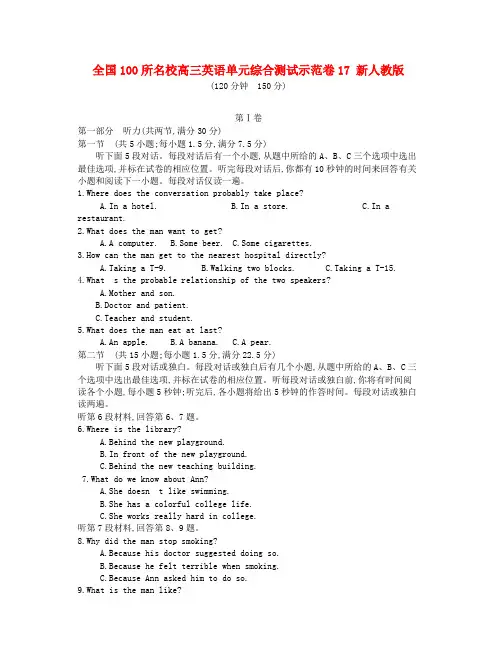
全国100所名校高三英语单元综合测试示范卷17 新人教版(120分钟150分)第Ⅰ卷第一部分听力(共两节,满分30分)第一节(共5小题;每小题1.5分,满分7.5分)听下面5段对话。
每段对话后有一个小题,从题中所给的A、B、C三个选项中选出最佳选项,并标在试卷的相应位置。
听完每段对话后,你都有10秒钟的时间来回答有关小题和阅读下一小题。
每段对话仅读一遍。
1.Where does the conversation probably take place?A.In a hotel.B.In a store.C.In a restaurant.2.What does the man want to get?A.A computer.B.Some beer.C.Some cigarettes.3.How can the man get to the nearest hospital directly?A.Taking a T-9.B.Walking two blocks.C.Taking a T-15.4.What s the probable relationship of the two speakers?A.Mother and son.B.Doctor and patient.C.Teacher and student.5.What does the man eat at last?A.An apple.B.A banana.C.A pear.第二节(共15小题;每小题1.5分,满分22.5分)听下面5段对话或独白。
每段对话或独白后有几个小题,从题中所给的A、B、C三个选项中选出最佳选项,并标在试卷的相应位置。
听每段对话或独白前,你将有时间阅读各个小题,每小题5秒钟;听完后,各小题将给出5秒钟的作答时间。
每段对话或独白读两遍。
听第6段材料,回答第6、7题。
6.Where is the library?A.Behind the new playground.B.In front of the new playground.C.Behind the new teaching building.7.What do we know about Ann?A.She doesn t like swimming.B.She has a colorful college life.C.She works really hard in college.听第7段材料,回答第8、9题。
Unit 1 Teenage Life 单元测试一、听力(共两节,满分30分)第一节(共5小题;每小题1.5分,满分7.5分)听下面5段对话。
每段对话后有一个小题,从题中所给的A、B、C三个选项中选出最佳选项,并标在试卷的相应位置。
听完每段对话后,你都有10秒钟的时间来回答有关小题和阅读下一小题。
每段对话仅读一遍。
1. What’s the weather like now?A. Sunny.B. Rainy.C. Snowy.2. What is Lucy doing?A. Reading a book.B. Doing homework.C. Writing a story.3. When does the movie begin?A. At 3:25.B. At 3:30.C. At 3:35.4. How will Mike go home?A. On foot.B. By bike.C. By bus.5. Which dress does the woman want to wear today?A. The black one.B. The red one.C. The blue one.第二节(共15小题;每小题1.5分,满分22.5分)听下面5段对话或独白。
每段对话或独白后有几个小题,从题中所给的A、B、C三个选项中选出最佳选项,并标在试卷的相应位置。
听每段对话或独白前,你将有时间阅读各个小题,每小题5秒钟;听完后,各小题将给出5秒钟的作答时间。
每段对话或独白读两遍。
听第6段材料,回答第6、7题。
6. What happened to Tom?A. He fell over at home.B. His legs were injured.C. A man ran into him on the street.7. What do we know about the phone?A. It dropped and broke.B. Tom used it to call the police.C. It was stolen by someone else.听第7段材料,回答第8、9题。
全国100所名校高三英语单元综合测试示范卷12 新人教版(120分钟150分)第Ⅰ卷第一部分听力(共两节,满分30分)第一节(共5小题;每小题1.5分,满分7.5分)听下面5段对话。
每段对话后有一个小题,从题中所给的A、B、C三个选项中选出最佳选项,并标在试卷的相应位置。
听完每段对话后,你都有10秒钟的时间来回答有关小题和阅读下一小题。
每段对话仅读一遍。
1.What does the man suggest?A.Buying a new car.B.Repairing the car.C.Selling the car.2.How did the woman get back home?A.By bus.B.On foot.C.By car.3.What happened to the woman?A.She couldn t find a seat.B.Her suitcase was lost.C.She missed the train.4.How much does an ice-cream cost?A.1 dollar.B.2 dollars.C.8 dollars.5.Where does the conversation probably take place?A.In a library.B.In a restaurant.C.In a store.第二节(共15小题;每小题1.5分,满分22.5分)听下面5段对话或独白。
每段对话或独白后有几个小题,从题中所给的A、B、C三个选项中选出最佳选项,并标在试卷的相应位置。
听每段对话或独白前,你将有时间阅读各个小题,每小题5秒钟;听完后,各小题将给出5秒钟的作答时间。
每段对话或独白读两遍。
听第6段材料,回答第6、7题。
6.Why can t the woman eat the ice-cream?A.Because she doesn t like the tastes.B.Because she is on a diet.C.Because she is quite full.7.What kind of person is the woman?A.She is fond of eating.B.She is easy to persuade.C.She has a strong will.听第7段材料,回答第8、9题。
全国100所名校高三英语单元综合测试示范卷10 新人教版(120分钟150分)第Ⅰ卷第一部分听力(共两节,满分30分)第一节(共5小题;每小题1.5分,满分7.5分)听下面5段对话。
每段对话后有一个小题,从题中所给的A、B、C三个选项中选出最佳选项,并标在试卷的相应位置。
听完每段对话后,你都有10秒钟的时间来回答有关小题和阅读下一小题。
每段对话仅读一遍。
1.When was the named BAA changed to NBA?A.In 1943.B.In 1946.C.In 1949.2.What will the speakers do in the evening?A.Have a picnic.B.Go to a party.C.Go shopping with Mary.3.Why did the man change his job?A.He had to get up early.B.Working in the bookstore was boring.C.Working in the bookstore was very tired.4.What s the woman trying to do?A.Find a shopping center.B.Get some small change.C.Find a parking lot.5.Where will the man be tonight?A.In the park.B.At the stadium.C.At a supermarket.第二节(共15小题;每小题1.5分,满分22.5分)听下面5段对话或独白。
每段对话或独白后有几个小题,从题中所给的A、B、C三个选项中选出最佳选项,并标在试卷的相应位置。
听每段对话或独白前,你将有时间阅读各个小题,每小题5秒钟;听完后,各小题将给出5秒钟的作答时间。
每段对话或独白读两遍。
第一套 Units 1~2(120分钟150分)第Ⅰ卷第一部分:听力(共两节,满分30分)第一节(共5小题;每小题1.5分,满分7.5分)听下面5段对话。
每段对话后有一个小题,从题中所给的A、B、C三个选项中选出最佳选项,并标在试卷的相应位置。
听完每段对话后,你都有10秒钟的时间来回答有关小题和阅读下一小题。
每段对话仅读一遍。
1.What is the man probably?A.A postman.B.A policeman.C.A shop assistant.2.How old is the man s daughter?A.6 months old.B.12 months old.C.24 months old.3.When did the woman plan to go to Spain?A.In spring.B.In summer.C.In autumn.4.What do we know about the woman?A.She was always in good shape.B.She stopped exercising one year ago.C.She lost a lot of weight in one year.5.Where will the two speakers go after they get something to eat?A.To the bookstore.B.To the cinema.C.To the hospital.第二节(共15小题;每小题1.5分,满分22.5分)听下面5段对话或独白。
每段对话或独白后有几个小题,从题中所给的A、B、C三个选项中选出最佳选项,并标在试卷的相应位置。
听每段对话或独白前,你将有时间阅读各个小题,每小题5秒钟;听完后,各小题将给出5秒钟的作答时间。
每段对话或独白读两遍。
听第6段材料,回答第6、7题。
6.How did the woman get back from Edinburgh?A.By train.B.By air.C.By bus.7.Where did the woman get help?A.From the hotline.B.From the Internet.C.From the newspaper. 听第7段材料,回答第8、9题。
8.When was the term “hot-desking” brought into common use?A.In the 1970s.B.In the 1980s.C.In the 1990s.9.What does the man probably do?A.A salesman.B.A tour guide.C.A bank clerk.听第8段材料,回答第10至12题。
10.What do we know about the man s new apartment?A.It is near his office.B.The rent costs less.C.The neighborhood is organized.11.How far is it from the man s new apartment to the train station?A.20 minutes walk.B.20 minutes drive.C.30 minutes walk.12.Which means of transport will the man probably choose to go to the supermarket nearby?A.The car.B.The bus.C.The bike.听第9段材料,回答第13至16题。
13.What day is it today?A.Sunday.B.Friday.C.Monday.14.Which subject did the man choose in the end?A.History.B.English.C.Geography.15.How many books does the man need to read?A.43.B.57.C.75.16.What comes with the woman s reading list?A.Her class schedule.B.Her school reports.C.Her activity plans. 听第10段材料,回答第17至20题。
17.When was Martin Luther King admitted into university?A.In 1929.B.In 1944.C.In 1955.18.Why was a black woman arrested?A.Because she sat in the white part of a city bus.B.Because she stayed in a hotel for white people.C.Because she studied in a school for white people.19.What did the whites do to prevent the protest?A.They didn t take the bus.B.The attacked Martin secretly.C.They spread false stories about Martin.20.How long did the protest last?A.About two years.B.About a year and a half.C.A bit over a year.试题答案1~5 ACBCB 6~10 BACAB 11~15 ACCAB 16~20 ABACC附:听力部分录音材料(Text 1)M:Here is some express mail for you from New York. Could you please sign your name here?W:Sure. Thanks.(Text 2)W:Oh, these “yummy mummies” make me sick. Look how thin she is—and she had a baby only 6 months ago.M:Yeah, my wife gets really depressed when she sees moms like that. She had our daughter 2 years ago and she still can t lose the weight.(Text 3)W:I wanted to go to Spain in August but it s so expensive.M:Well, summer is peak season, so it s the most expensive time. Why not go later in the year?(Text 4)M:Oh, Susan, you look so good—quite different from when I saw you twoyears ago.W:Well, I started jogging regularly one year ago and my weight started dropping from 243 pounds to the 160 pounds I am now.(Text 5)W:I m hungry—shall we go for a bite to eat?M:Sounds good.W:And then how about going to see the new Harry Potter film afterwards?M:Yes. If we meet at 6 we should have time for a quick bite first.(Text 6)W:Have you ever called a hotline?M:No, have you?W:Yes. When I was in Edinburgh recently there was a problem at the airport and a lot of flights were cancelled.M:So what did you do?W:I had to call a hotline to find out if my flight was cancelled.M:And was it?W:Unfortunately, yes. But I called the hotline the next day, and luckily it was back on.M:That s not too bad; at least you got back safely.W:Yes, hotline numbers can be very useful at times when you need quick access to help or information.(Text 7)W:Is this your desk?M:No, we have hot-desking here. I work at any desk I want. It s much more efficient.W:What does hot-desking mean?M:Well, this new term was brought into common use in the 1990s to describea new working practice. It means to share a desk or office space. Workers don t have their own desks, but share them at different times.W:But I d think you d like to have your things around you!M:I know what you mean. This system of working is well suited to firms that have staff that are frequently out of the office, for example salespeoplelike me, who are mostly on the road. I guess hot-desking is a good idea for those kinds of employees.(Text 8)W:Did you move into your new apartment?M:Yes, but I m afraid it s still a mess. I haven t put anything away yet. It ll probably take me about three weeks to get everything organized.W:Don t worry. Have you taken a walk around your neighborhood yet?M:Well, I took a long walk through the neighborhood this morning on my wayto the train station. It took me 20 minutes.W:That s a long way to the train station, but then you only pay 800dollars a month. It s hard to decide which is better, a shorter commute or lower rent.M:I thought paying a lower rent would be better, but now I m not sure.W:Is there a supermarket nearby?M:Yes, if you don t mind the 30-minute walk there.W:Sounds like you d better buy a bicycle.M:That s right, or I m going to spend a lot of time walking.(Text 9)W:Hi, Tim! I ve been wondering when I d run into you. Have you been here long?M:I arrived yesterday, on Sunday. How about you?W:I got here a few days ago, on Saturday. No, wait a minute—what s today? Sorry. Friday, not Saturday.M:But we didn t have to be here till today.W:Yes, I know, but I wanted to get my things moved into my room, and just take a look around. So, did you decide to do English in the end?M:No, I changed my mind and chose history instead. And you re doing biology, right?W:Yes, although to start with I couldn t decide between that and geography. M:How much reading have you got?W:Let me look at my list ... Wow. It does look pretty long.M:Well, I counted 57 books on mine. I could hardly believe it! So what s your list like?W:Well, it s not as long as yours, but it s still pretty big. There are 43.M:Have you got your class schedule yet?W:Yeah. It came with the reading list. When s your first lecture?M:Tuesday. How about you?W:The day after. It s my busiest day. I ve got two lectures in themorning and one in the afternoon.(Text 10)Martin Luther King was born in Atlanta, Georgia, in 1929.He began his university studies when he was fifteen years old, and received a doctor s degree in religion.In 1955, a black woman in Montgomery was arrested for sitting in the white part of a city bus. Doctor King became the leader of a protestagainst the city bus system. It was the first time that black southerners had united against the laws of racial separation.At first, the white citizens of Montgomery did not believe that the protest would work. They thought most blacks would be afraid to fightagainst racial separation. But the buses remained empty. Some whites used tricks to try to end the protest.They spread false stories about Martin Luther King and other protest leaders. One story accused King of stealing money from the civil rights movement. Another story charged that protest leaders rode in cars whileother protesters had to walk. But the tricks did not work, and the protest continued.It lasted three hundred and eighty-two days. Finally, the United States Supreme Court ruled that racial separation was illegal in the Montgomerybus system.第二部分:阅读理解(共两节,满分40分)第一节(共15小题;每小题2分,满分30分)阅读下列短文,从每题所给的四个选项(A、B、C和D)中,选出最佳选项。